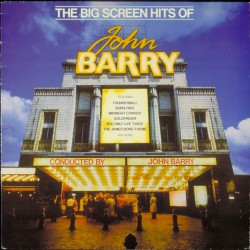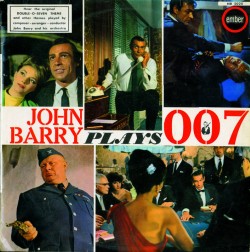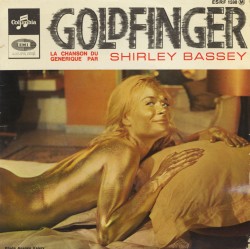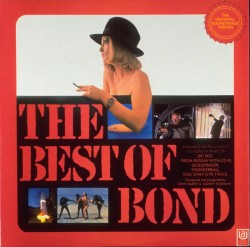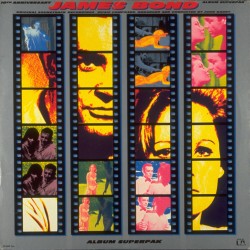Stephen Woolston - Jan 5, 2002
John Barry was probably once the biggest name in film music. Bigger than Goldsmith. Bigger than Williams. Today he is appreciated massively but mostly in retrospect and out of affection for his first thirty years in the medium. He doesn't appear to have been the directors' choice of this or the last decade, and a rapidly decreasing body of film music listeners understands his music.
Many of the new detractors choose to disfavourably compare John Barry's scores with the grandeur and energy of such epic scores as Ben Hur, or modern actioners from Star Wars to Total Recall. They cite the excitement of the big sound and the energy of driving action cues. It's a flawed comparison. It assumes all film music aspires to the same sensibilities and all composers to the same films. Despite the Bond movies and Dances With Wolves, John Barry is not a composer of epic action and adventure scores. He never has been.
John Barry developed his style in a reactionary phase in films: the sixties. Golden age classics and old fashioned direction values were subsiding. The new generation had been disaffected by war but enjoyed their young adulthood amidst the excitement of new social and sexual values. Culture had revolutionised. There was new economic growth, new eras in world politics, new world anxieties and new cultural icons. The new directors admired the cinematic new wave of Jean Luc Godard and Francois Truffaut. Production line cinema had gone out of vogue in favour of films stamped with personal style and authorship. Directors wanted to express their political views and became more interested in what they could say on a smaller, more intimate scale about the human condition.
The result was a wave of films interested in pseudo-ordinary people, intimate and rich in expressionism and stylistic freedom. The list of such films in Barry's CV are endless: The Knack, although an anarchic comedy, is still a close study of people heavily influenced by new individual expression. Bryan Forbes' films became a standard bearers of the new plain cinema in England. The list includes Petulia, The Chase, Midnight Cowboy, Follow Me, Walkabout, Dutchman, The Appointment. None of them were plain films stylistically but all favoured these pseduo-real people to the glamour icons that had gone before.
|
John Barry had a perfect European sensibility suited to these films. He was the English Nino Rota, not the English Rosza. By establishing and insisting on memorable melodic themes in intimate arrangements, his music brilliantly observed the humour, tears and drama of the people that had been filmed, their unusual bonds and their very different journeys through this life. It was a perfect marriage of film and music and John Barry was its undisputed master.
In 1977, one film changed the industry forever. Star Wars revived interest in fantasy in an irrevocable way. Society was emerging from its post war optimism with a new drudge of industrialism. It brought a new need for escapism. Cinema as art subsided towards cinema as the easy story telling medium, and character studies became out of vogue. The world community's taste in films shifted increasingly towards the low brow. As we stand today, by consensus and box office vote, we like our entertainment dumb, fantastic, unreal and very, very noisy. Intimacy in films has almost died, at least in America.
It would be an oversimplification to box Barry in as simply the composer who scored innovatively styled character films. After all, his music often swelled beyond character themes. I'm thinking of the defection scenes of The Tamarind Seed, and the fight music of The Ipcress File. But these cues extended out from a score whose central point was nonetheless a theme for a character or place. Bond was a form of escapism too, and he had mastered that art. Yet Bond is a remarkable exception. These worked mostly because of the scores were derivation from a song, and songwriting is a superb springboard for a melodist such as Barry. But even here Barry did not compose as for the classical epics. Bond music was hot, but that heat came from the exploration of combined jazz and Bacharachian easy listening, with mellow strings and cracking high notes in brass. Not from the jagged rhythms voiced by today's action composers.
The wonderful strokes of John Barry's intimate melodies is an intimate poetry undiscovered and unachieved by the modern purveyors of action music such as Zimmer and Elfman. Sadly, there's a declining demand for that in the modern American film. Not the mainstream film at least. There are some. American Beauty would have been an ideal Barry vehicle. Playing By Heart was another ideal vehicle that Barry did score. I rather fancy that Barry might have come up with something very interesting for Pulp Fiction too.
|
In fact, it's too sad to reflect on some of the wonderful films that Barry could have really gone to town with. Imagine the wondrous score he might have written to 2001. Imagine the dark wonder he might have written in Apocalypse Now.
So where does Barry go from here? He can also fish for those few films like American Beauty that do call for a composer who can observe bittersweet humanity in music. But that's if the directors rediscover him. Could he go back into Bond to re-establish his popularity to get those assignments? A possibility, but only likely to work if he can have that song springboard back. Numb action films are not the solution. Neither The Specialist nor Mercury Rising could light the right fires, though in each case his music was strongest looking at the strange bonds of the characters again.
If Barry can't relate to something delicately emotional or explore the jazz idiom he has no place to go. It's not that Barry can't score humanly empty films with professionalism and craft. The Black Hole and Game of Death proved that. But then these scores have no special relevance in his career.
The modern trends simply do not suit Barry. Conversely, Barry does not suit them. Films like Hollow Man, Lord of the Rings, Planet of the Apes and Harry Potter are truly more suited to names like Jerry Goldsmith and John Williams.
Perhaps the best way to tap in to what Barry does truly well is to do what Herrmann did when his career ceased to flourish in Hollywood. Herrmann went to Europe. Not for long, but long enough to be rediscovered in a major way. Herrmann had become unpopular in Hollywood for his lack of pop scores, but he found a new vehicle for himself in films like The Bride Wore Black. Europe is still the predominant home of films about humanity made in creative styles. If John Barry could have scored Cinema Paradiso or even the difficult French film Beau Travail, he might have written something remarkable.
|
Bottom line? It is an empty comparison to put Barry head to head with Rosza on accomplishment in biblical epics, or with Williams on accomplishment in summer blockbusters. It's like saying Steve Martin is funnier than Gregory Peck. So what? Answer this. How would Rosza do in a head to head on accomplishments in melody and intimacy?
Stephen Woolston









